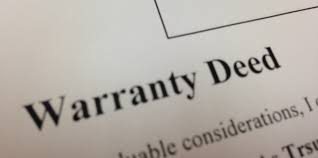When you’re purchasing real estate, you’ll quickly hear a number of terms thrown around. Most people tend to assume that Property Deeds and titles are the same thing, but they actually refer to two separate legal concepts.

Property deeds are the legal documents that are used to transfer real estate property titles from one party to another. It must be a written document, according to the Statute of Frauds. The property deed must be executed in the presence of a notary in order for it to be legal. Plus, it must be recorded at the County Recorder’s office. Once both of these steps are taken of, the people who are named on the deed own the title to the property named on the deed. Each time the property is sold, a new deed must be executed in order for the transfer of ownership to take place. Sometimes the deed is referred to as the vehicle of property interest transfer. The transfers can be less than the title that you actually have.
For a deed to be legally operative, several essentials must exist including the identification of the grantor and grantee, and the adequate description of the property. In addition, deeds may be categorized in a number of ways including warranty, quitclaim and special purpose deeds.
Historically, real property was transferred through a ceremonial act known as “livery of seisin.” In this act, the person transferring the land handed a twig of clod of turf from the land to the person taking delivery of the land. A verbal or written statement often accompanied the gesture, though it was the livery of seisin that legally transferred the title to the property.

Property deeds include specific pieces of information such as the following:
- It must be in writing. While most deeds are completed on printed forms, there is no legal requirement that any specific form be used as long as the essential elements are included.
- The grantor must have legal capacity, and the grantee must be capable of receiving the grant of the property. A person who is competent to make a valid contract is considered competent to be a grantor.
- The grantor and grantee must be identified in such a way as to be ascertainable.
- The property must be adequately described.
- Operative words of conveyance must be presented. All standard form deeds include the necessary legal language that actually transfers the property.
- The deed must be signed by the grantor or grantors if the property is owned by more than one person.
- The deed must be legally delivered to the grantee or to someone acting on the grantee’s behalf.
- The deed must be accepted by the grantee. Typically, deeds are accepted by the grantee but in certain circumstances, the grantee could reject delivery of the deed.
Deeds can be classified in numerous ways. Broadly, deeds are classified as official or private. Official deeds are executed pursuant to court or legal proceedings. Most property transaction, however, involve individuals and business entities using private deeds.
Deeds are also categorized based on the type of title warranties provided by the grantor.
The different types of deeds include:

General Warranty Deed. It offers the grantee the most protection. With this type of deed, the grantor makes a series of legally binding promises (called covenants) and warranties to the grantee (and their heirs) agreeing to protect the grantee against any prior claims and demands of all persons whomsoever in regards to the transferred land.
Special Warranty Deed. Where in a generally warranty deed the grantor promises to warrant and defend the title conveyed against the claims of all persons, the grantor of a special warranty deed warrants that they received the title to the property, and that they have not done anything while holding the title to create a defect. In other words, only defects that arose during the grantor’s ownership of the property are warranted. Due to this limitation, the special warranty offers the grantee less protection than the general warranty deed. Many purchasers of real estate will insist on a general warranty deed to protect against problems that could arise as a result of a special warranty deed.

Quitclaim Deed. This is also called a non-warranty deed. This offers the grantee the least amount of protection. This type of deed conveys whatever interest the grantor currently has in the property, if any. No warranties or promises regarding the quality of the title are made. If the grantor has a good title, the quitclaim deed is essentially as effective as a general warranty deed. However, if the title contains a defect, the grantee has no legal recourse against the grantor under the deed. This type of deed is often used if the grantor is not sure of the status of the title or if the grantor wants no liability under the title covenants.
Warranty and quitclaim deeds are the most commonly used.
Special Purpose Deeds. These are frequently used in connection with court proceedings and instances where the deed is from a person acting in some type of official capacity. Most special purpose deeds offer little to no protection to the grantee and are essentially quitclaim deeds. Types of special purpose deeds include but are not limited to: Administrator’s Deed, Executor’s Deed, Sheriff’s Deed, Tax Deed, Deed in Lieu of Foreclosure, and Deed of Gift.
Life Estate Deeds. These are used to transfer real estate property directly to a new owner who is referred to as the remainder man upon the previous owner’s death. Transfer on death deeds allow a property owner to designate a beneficiary who will receive ownership of the real estate property upon the current owner’s death.
Survivorship Deeds. These are commonly used by married couples who purchase property together, pass the title or ownership of the property to the surviving partner. This type of deed allows the owners to avoid probate upon the first death only. Survivorship deeds should not be used when more than two people are involved.

The transfer of an owner’s title is made by a deed. Certain essential elements must be contained within the deed in order for it to be legally operative. Different deeds provide various levels of protection to the grantee, and the obligations of a grantor are determined by the form of the deed. Since deeds are important legal documents that affect ownership interests and rights, a qualified real estate attorney should be consulted.
Sources: ballennetwork.com, Investopedia.com, rocketlawyer.com
♦♦♦♦♦♦♦♦♦♦♦♦♦♦♦♦♦♦♦♦♦♦♦♦♦♦♦♦♦♦♦♦♦♦♦♦♦♦♦
For your Anchorage Alaska home hunting, please check out our site.
Call or text us today!

And don’t forget to:




